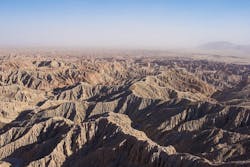California Water Board Blocks Farmers from Diverting Water from Delta Watershed
Most of California is experiencing an extreme drought, and demand for water from rivers and streams has outstripped supply 16-fold in the San Joaquin River watershed and three-fold in the Sacramento River, according to the California Water Resources Control Board staff news release.
The Delta watershed stretches from Fresno to the border with Oregon, and could lead to formal curtailment orders for about 5,700 water rights holders as soon as Aug. 16, reported CalMatters. There are a total of 6,600 water right holders total.
The regulations come after orders were issued to nearly 900 water users along the Russian River, which is experiencing intense drought conditions. The five water board members approved the rule despite opposition from representatives of Central Valley growers.
As per the order, water users who continue to divert could face penalties of up to $1,000 per day and $2,500 per acre-foot of illegally diverted water, according to Erik Ekdahl, deputy director of the board’s division of water rights, reported CalMatters.
“It is imperative that we move urgently to better manage the water we still have and prepare for the continuation of drought conditions,” said Board Chair E. Joaquin Esquivel in the California Water Resources Control Board Staff news release. “The Delta watershed is a resource shared by agriculture, urban areas, rural towns and fish and wildlife, among many others. This decision is not about prioritizing one group over the other, but about preserving the watershed for all, implementing our water rights priority system, and ensuring we manage through this drought, especially for critical health and safety needs.”
According to the board, these dwindling flows may risk salty backwash from the Pacific, ultimately tainting supplies for drinking water, farmers and fish. Six growers organizations, including the California Farm Bureau and the Almond Alliance of California, said in a comment letter that the board does not have authority to curtail the rights of users with claims for properties next to waterways or that pre-date 1914.
However, supplies of up to 55 gallons per person per day for minimum human health and safety needs, such as drinking and household use, are exempted, reported CalMatters.
